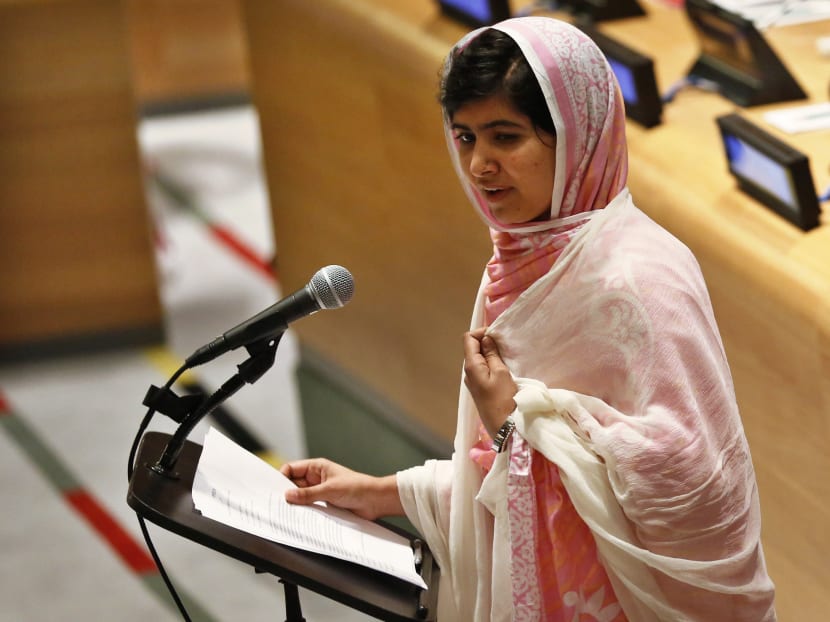Taliban’s letter to Malala Yousafzai: This is why we tried to kill you
KARACHI (Pakistan) — A senior member of the Pakistani Taliban has written an open letter to Ms Malala Yousafzai — the teenager shot in the head as she rode home on a school bus — expressing regret that he did not warn her before the attack, but claiming that she was targeted for maligning the insurgents.

Malala Yousafzai, wearing a white shawl that had belonged to former Pakistani Prime Minister Benazir Bhutto, gives her first speech since the Taliban in Pakistan tried to kill her for advocating education for girls, at the United Nations Headquarters in New York, in this July 12, 2013 file photo. Photo: Reuters
KARACHI (Pakistan) — A senior member of the Pakistani Taliban has written an open letter to Ms Malala Yousafzai — the teenager shot in the head as she rode home on a school bus — expressing regret that he did not warn her before the attack, but claiming that she was targeted for maligning the insurgents.
Adnan Rasheed, who was convicted for his role in a 2003 assassination attempt on the country’s then-president Pervez Musharraf, did not apologise for the attack, which left Ms Malala gravely wounded, but said he found it shocking.
“I wished it would never happened (sic) and I had advised you before,” he wrote.
Ms Malala was 15 when she and two classmates were targeted by a masked gunman who picked them out on a school bus as they went home from school in Pakistan’s northwest Swat valley last October.
She was seriously injured in the attack, and was flown to Britain to receive specialist treatment from doctors in Birmingham, where she and her family now live.
Last week, she celebrated her 16th birthday by delivering a defiant speech at the United Nations in New York, in which she called on world leaders to provide free schooling for all children.
In the letter, Rasheed claimed that Ms Malala was not targeted for her efforts to promote education, but because the Taliban believed she was running a “smearing campaign” against it.
“You have said in your speech yesterday that pen is mightier than sword,” Rasheed wrote, referring to Ms Malala’s UN speech, “so they attacked you for your sword not for your books or school.”
The rambling four-page letter, in patchy English, citing Bertrand Russell, Henry Kissinger and historian Thomas Macaulay, was released to media organisations in Pakistan.
In it, Rasheed — a former member of Pakistan’s air force, who was among 300 prisoners to escape jail in April last year — advises Ms Malala to return to Pakistan, join a female Islamic seminary and advocate the cause of Islam.
He admitted that the Taliban are “blowing up” schools, but justified the attacks on the grounds that the Pakistani army and the paramilitary Frontier Corps use schools as hideouts.
Hundreds of schools have been targeted in Pakistan’s north-west: Activists say some had been used by the military, but many attacks were motivated by the Taliban’s opposition to girls’ education.
The Taliban commander also justified recent attacks in Pakistan on health workers vaccinating children against polio by claiming the west was trying to sterilise Muslims.
The letter is clearly intended to influence opinion in Pakistan: Although in much of the world Malala has been hailed as a symbol of courage, at home she has been the subject of intense criticism and vilification. Online commentators have described her as a “drama queen” and even accused her of spying for the CIA.
Rasheed contrasted international support for Ms Malala with the lack of coverage given to those killed in US drone attacks — a source of intense grievance in Pakistan.
“If you were shot (by) Americans in a drone attack, would (the) world have ever heard updates on your medical status? ... Would you were called to UN? Would a Malala day be announced?”
Mr Gordon Brown, a UN special envoy on global education, said: “Nobody will believe a word the Taliban say about the right of girls like Malala to go to school until they stop burning down schools and stop massacring pupils.” THE GUARDIAN






